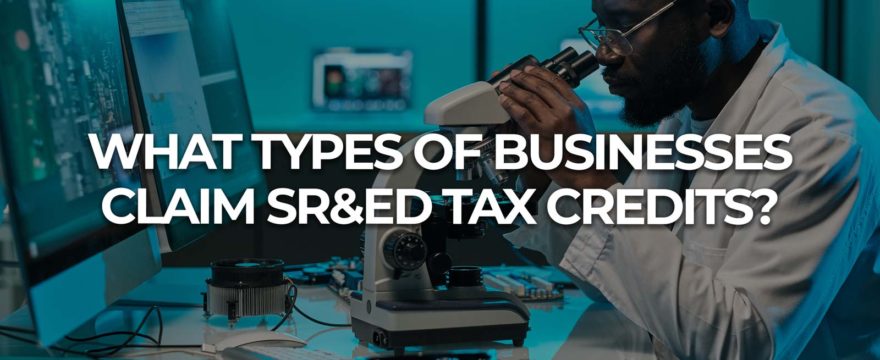
The Scientific Research and Experimental Development (SR&ED) tax incentive program is among Canada’s largest sources of government-backed financial support. Each year, thousands of claimants receive tax refunds for eligible expenses when they claim their SR&ED tax credits, many of whom are small businesses.
As beneficial as SR&ED tax credits are for helping Canadian companies innovate and grow, businesses should know that these incentives only extend to specific activities. Learn what constitutes qualified SR&ED expenditures and what kinds of businesses are eligible to claim these tax credits.
What is SR&ED?
The goal of the SR&ED program is to prompt more businesses to conduct research and experimental development in Canada. These activities advance scientific or technological knowledge through analysis or experimentation. Tax refunds are available to qualifying enterprises in all sectors.
SR&ED incentives are administered differently depending on the size and type of business. Organizations will either receive a refundable or non-refundable investment tax credit (ITC) or a deduction against income. Canadian-controlled private corporations (CCPCs) can earn ITCs on 35% of eligible SR&ED expenses.
One of the most appealing features of the SR&ED program is that eligibility does not depend on the success of SR&ED-eligible projects — the initiative’s primary objective is to stimulate more innovation in Canada. With these refunds, companies access more capital for performing R&D and managing cash flows. This model makes SR&ED tax credits particularly enticing for small businesses.
What are SR&ED-eligible expenses?
There are two main requirements for claiming the SR&ED ITC. First, the work must aim to expand scientific knowledge or realize technological advancement. These activities must also involve systematic research using analysis or experimentation. The work should be conducted in a field of science or technology.
What types of research meet these conditions? The Government of Canada lists three general categories of eligible work — basic research, applied research, and experimental development. Activities that directly support these categories may also qualify. This type of work includes:
- Design
- Testing
- Engineering
- Data collection
- Operations research
- Mathematical analysis
- Computer programming
- Psychological research
Some work is not eligible for SR&ED tax incentives, even if carried out in support of qualifying activities. These tasks include:
- Regular data collection
- Changes in project style
- Market or sales research and related activities
- Quality control for products, services, and processes
- Research related to social sciences or the humanities
- Efforts to attain or produce energy resources and other materials (drilling, prospecting, etc.)
- Commercialization of a new or updated product, device, material, or process
If you are unsure if your business qualifies for SR&ED tax credits, the Government offers a resource called the Self-Assessment and Learning Tool (SALT) to help you determine your eligibility. It can also assist you in calculating a projected amount of ITCs you may be eligible to claim for a single year. You may also utilize Easly’s SR&ED refund calculator to get an estimate of your refund.
What types of businesses typically claim SR&ED expenses?
While the SR&ED program is open to many types of businesses conducting R&D in Canada, incentive rates differ depending on the type of business. The following details the SR&ED tax incentives available to different types of entities:
Canadian-Controlled Private Corporations
Canadian-controlled private corporations (CCPCs) are entitled to one of the largest incentives — they can obtain a refundable ITC at an enhanced rate of 35% on eligible SR&ED costs up to their expenditure limit for that tax year. At the 35% rate, the maximum expenditure limit is $3 million. If a CCPC has qualifying expenses exceeding its expenditure limit, it may earn a non-refundable ITC at 15%.
Non-CCPC Organizations
Businesses that do not qualify as CCPCs, such as public corporations or other types of private companies, can claim a non-refundable ITC at the 15% basic rate on qualified SR&ED expenditures. They can also use this ITC to lessen income tax payable.
Partnership Members
Partnerships are not taxpayers; therefore, individual members are not eligible to receive ITCs. However, the Government will extend an ITC to qualifying partnerships, which will then distribute resources to eligible members. The Government details the process that partnerships must follow when submitting SR&ED claims in their Partnerships Policy.
Can any business with eligible expenses apply?
Any business with eligibility may consider claiming SR&ED expenses to pursue more innovation and growth. In addition to enterprises, the program is also available to qualified individuals and trusts.
SR&ED tax incentives may serve as ideal business funding at the startup phase but can also be helpful at other growth stages. Whether you have experienced ample growth recently and are working toward enhancing your market presence or are in the maturity phase and have achieved more stability, you can claim qualifying SR&ED expenses to meet more objectives.
As mentioned, the program intends to serve companies across virtually all industries. Some sectors that may be eligible for SR&ED tax credits include:
- Agriculture
- Engineering
- Healthcare
- Technology
- Manufacturing
- Software Development
- Telecommunications
- Natural and Formal Sciences
SR&ED Tax Credit Financing with Easly
SR&ED is available to many businesses across the country and is extremely valuable when claims are maximized. However, waiting for your annual refund from the Canada Revenue Agency (CRA) results in a cash flow spike that is non-optimal from a cash management perspective.
Accelerate access to your SR&ED refund using Easly Advances. With Easly Advances, you decide when to tap into your accrued SR&ED refund. Begin accessing capital up to 18 months sooner than the status quo.
.png)
.png)
.png)
